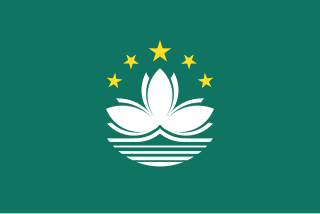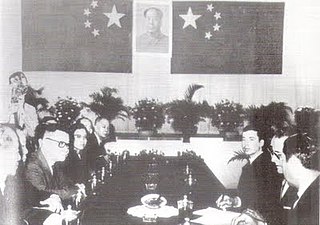Related Research Articles

Macau or Macao, officially the Macao Special Administrative Region of the People's Republic of China (MSAR), is a city and special administrative region of the People's Republic of China in the western Pearl River Delta by the South China Sea. With a population of about 680,000 and an area of 32.9 km2 (12.7 sq mi), it is the most densely populated region in the world.

The Macanese people are an East Asian ethnic group that originated in Macau in the 16th century, consisting of people of predominantly mixed Cantonese and Portuguese as well as Malay, Japanese, English, Sinhalese, and Indian ancestry.

Macau is an autonomous territory within China. A Portuguese colony until 1999, Macau has a diverse culture firmly rooted in Cantonese culture, with a mix of influences from East Asia and Western Europe. Macau is known for being the largest gambling center in the world.

Macanese patois, known as patuá to its speakers, is a Portuguese-based creole language with a substrate from Cantonese, Malay and Sinhala, which was originally spoken by the Macanese community of the Portuguese colony of Macau. It is now spoken by a few families in Macau and in the Macanese diaspora.

Tourism is a major industry in Macau. It is famous for the blend of Portuguese and Chinese cultures and its gambling industry, which includes Casino Lisboa, Macau, Sands Macau, The Venetian Macao, and Wynn Macau.
Macanese cuisine is mainly influenced by Cantonese cuisine, Portuguese cuisine, and influences from Southeast Asia and the Lusophone world, due to Macau's past as a Portuguese colony and long history of being an international gambling centre known for its vibrant hospitality and tourism industry. Minichi, egg tarts, pork chop buns, ginger milk and almond cakes are some of the region's most common delicacies. Common cooking methods make use of various spices such as turmeric, coconut milk, and cinnamon to give dishes an extra kick of aroma and enhancement of taste. However, many routinely consumed dishes in Macau belong to a subclass (Heungshan) of Cantonese cuisine. Many Macanese dishes resulted from the spice blends that the wives of Portuguese sailors used in an attempt to replicate European dishes. Besides local Chinese ingredients and seasonings, Macanese dishes also include those from Europe, Latin America, Africa, India, and Southeast Asia. Genuine Portuguese and Spanish cuisine can also be found in Macau. Common cooking techniques include baking, grilling, and roasting; the former is seldom seen in other styles of Chinese cooking.
The government of Macau confers honors every year in the form of decorations, medals and honorary titles.

The transfer of sovereignty of Macau from Portugal to the People's Republic of China (PRC) occurred on 20 December 1999.

João Maria Ferreira do Amaral was a Portuguese military officer and politician. While he was governor of Macau, he was assassinated by several Chinese men, triggering the Battle of Passaleão between Portugal and China.
Articles related to Macau include:

The 12-3 incident refers to political demonstrations and rioting against Portuguese rule in Macau that occurred on 3 December 1966. The incident, inspired by the Cultural Revolution in the People's Republic of China, occurred in direct response to a violent police crackdown against Chinese protestors demonstrating against corruption and colonialism in Macau. The incident is known as "12-3", in reference to the date of the riots. Pressured by business leaders in Macau and the mainland Chinese government, the colonial government agreed to meet the demands of the protestors and apologized for the police crackdown. Portuguese sovereignty over Macau diminished after the incident, leading to de facto Chinese control over the territory.

The following outline is provided as an overview of and topical guide to Macau:

The Government of the Macau Special Administrative Region allows citizens of specific countries/territories to travel to Macau for tourism or business purposes for periods ranging from 14 to 180 days without having to obtain a visa. For other entry purposes, such as establishing residence on a long-term basis, a different policy applies.
Henrique de Senna Fernandes was a Macanese writer. Born in 1923 as one of 11 siblings to an old Macanese family, whom settled in Macau over 250 years ago, he studied law at the University of Coimbra before becoming a writer. His work, written in Portuguese, evokes the atmosphere of the 1930s, 1940s and 1950s in the territory. Often focussing on the lives of characters of mixed racial origins, like the author himself, his work represents a unique viewpoint on the evolution of the territory in the twentieth century.

The Macau Gallery Melaka is a gallery about Macao in Bukit Peringgit, Melaka, Malaysia. Both Malacca and Macao were Portuguese colonies.

Lacassá Soup is a Macanese soup.

Amor e Dedinhos de Pé is a 1992 Portuguese-language Portuguese-French-Spanish film of romantic drama genre, directed and written by Luís Filipe Rocha and Izaías Almada, and starring Joaquim de Almeida, Ana Torrent and Jean-Pierre Cassel. It is based on the novel Amor e Dedinhos de Pé: Romance de Macau by the Macanese writer Henrique de Senna Fernandes. The film was premiered in Macau on 20 March 1992, and was released in France on 21 October of the same year. In Portugal it was released on 15 January 1993, and in Spain on 6 August of the same year.
The Health Bureau in Macau is mainly responsible for coordinating the activities between the public and private organisations in the area of public health, and assure the health of citizens through specialised and primary health care services, as well as disease prevention and health promotion.
Agnes Lam is a Macanese poet, educator, journalist and politician. As a member of the Civic Watch party, she was elected to Macau's legislature in their 2009 Legislative Assembly election, and was the only member of the party represented there. She is the Assistant Dean of the Faculty of Social Sciences at the University of Macau, and currently heads their Center for Communication. She has published on the history of print media in China. She writes several columns in Macau newspapers, and has written and published several volumes of poetry. Her writing has won several awards, in China and Macau.
Zhang Shaoling is a Macanese female weightlifter, competing in the 75 kg category. She represented Macau at international competitions.
References
- ↑ "Interview with Maria Helena de Senna Fernandes, Director of the Macao Government Tourism Office". www.smarttravelasia.com. Retrieved 2022-02-04.
- 1 2 "Maria Helena de Senna Fernandes". Pacific Asia Travel Association. Retrieved 2022-02-04.
- 1 2 3 4 "Special Report – "The Future is Feminist" * (11 – 15) | Macau Business" . Retrieved 2022-02-04.
- 1 2 3 "Maria Helena de Senna Fernandes, Director of MGTO". Macao News. Retrieved 2022-02-04.
- ↑ Lui, Prudence. "Senna Fernandes to succeed Antunes as Macau tourism chief | TTGmice". www.ttgmice.com. Retrieved 2022-02-04.
- ↑ "Maria Helena de Senna Fernandes service term as tourism office director extended by two years | Macau Business" . Retrieved 2022-02-04.
- ↑ "Off-track | GP Museum is back after four years of renovation" . Retrieved 2022-02-04.
- ↑ "Macao SAR Bestows Medal of Merit for Tourism". Macao Tourism. Retrieved 2022-02-04.
- ↑ "Faces leading the fight – macaomagazine.net" . Retrieved 2022-02-04.